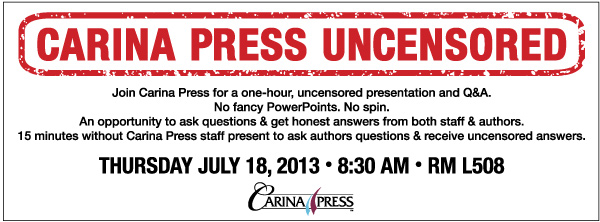 I’m over at Word Whores today (because I swapped last Sunday), talking about why drafting is the holy work and revising sucks.
I’m over at Word Whores today (because I swapped last Sunday), talking about why drafting is the holy work and revising sucks.
 Author: Jeffe Kennedy
Author: Jeffe Kennedy
Planning for a Long-Term Writing Career
 Lunch with, Joyce, the winner of the Brenda Novak Auction prize that Carolyn Crane and I sponsored. We took her out to lunch at the RWA convention and gave her all the best advice we could come up with on planning the next stages of her career. It was very fun and we wish her well!
Lunch with, Joyce, the winner of the Brenda Novak Auction prize that Carolyn Crane and I sponsored. We took her out to lunch at the RWA convention and gave her all the best advice we could come up with on planning the next stages of her career. It was very fun and we wish her well!
A theme that came up for me over and over at this convention was looking at the long-term career. It seemed we heard a lot of stories about writers who’d lasted through the ups and downs of the industry – and those who hadn’t. One gal I met had written for Kensington – my same publisher – back in the 1990s. She wrote nine books for them, in fact, then was dropped during one of the downturns. Her husband also divorced her at the same time. By the time she sorted out her life, she discovered her writing career had tanked without her noticing.
Quite the cautionary tale.
Oh, sure, you can make judgments here. Having an agent would have helped. She likely missed signals, should have been paying better attention, but the fact remains that she “made it.” She had nine books with a very good publisher. And POOF. Gone.
During the same conference, I attended one of my favorite workshops, The Secrets of the Bestselling Sisterhood, put on by long-time career pals and friends, Jayne Ann Krentz and Susan Elizabeth Phillips. They often put their long careers in terms of their longevity when so many other very good writers have not survived. From their discussion, I tweeted:
Feasting at the RWA Conference
What Genres Do You Read While Drafting?

This is the Kensington cocktail party at the RWA conference. I’m apparently describing something very large to Alexandra Nicolajsen, who manages the digital marketing for the house. Maybe a bus ad.
(That’s the lovely Carolyn Crane sitting next to me.)
As I mentioned previously, I brought back a lot of paper books from RWA, along with a wish list of ebooks I want to download to the Kindle. However, I also have a big road trip coming up. Today I’m flying up to Denver where I’ll help my mom and Stepdad Dave rent a U-Haul truck. My mom has sold my childhood home – after 41 years! – and they’re moving permanently into their Tucson house.
I’d already taken some things a few weeks ago and my aunt went and took some things. Then they had their friends over for a “take some things” party, followed by an estate sale. So there’s not THAT much to convey to Tucson. But there will be two vehicles and neither of them are all that comfortable driving alone for long periods of time. We’ll drive down to Santa Fe on Saturday (about 5.5 hours), spend the night, then go on to Tucson (~8 hours). I’ll hang out on Monday, then drive their “extra” vehicle back to Santa Fe, where it will now be ours. All of this boils down to one thing: audio books.
I sorely need to listen to some books, to help pass the solo driving time.
So, I went to Audible to find the right ones. After all, this is a perfect opportunity to catch up on books I really want to read – for research or because friends wrote them or because they’ve been on my list for a while. But then the two books I wanted most weren’t on Audible! I considered doing them on the Kindle text-to-voice, but I don’t LOVE that. The robo-voice takes away from the story for me. My friend, Sassy Outwater, who is blind, essentially told me I couldn’t bitch about that because, hello, welcome to HER world. I see her point, because Audible books are *expensive* – but I still like them better.
At any rate, I was in the odd position of finding books, any books, on Audible that would be good for the trip. And I didn’t want to burn a lot of time searching. Also, since I’ll be losing writing time doing this trip, I wanted books that would at least feed the story I’m working on, which is an Adult Fantasy. (Book 2 of Twelve Kingdoms, for those who don’t have my life memorized.)
Here’s where I get to my point, because I do have one (shocking!). I wonder what better feeds an in progress story – the same genre or a different one? Someone at the conference says she never reads books in her own genre, because she’s afraid of accidentally stealing ideas. That doesn’t really resonate for me. But I do think it’s better for me to read other genres than the one I’m cooking in.
I ended up choosing the first in Josh Lanyon’s Adrien English m/m detective series, as it’s been recommended to me many times. I’ll listen to Susan Elizabeth Phillips’ contemporary romance Ain’t She Sweet, though I’ve read it before, because it’s practically the text book on how to redeem an unlikable heroine – which I’m dealing with in the story I’m writing. Finally, I got Christina Lauren’s erotic romance Beautiful Bastard, so I can find out what got people so excited about it.
So, I’m curious. For writers, what do you read while you’re drafting? And for the non-writers, do you choose genre by what else is going on in your life?
One commenter will win a book from the ones pictured in Tuesday’s post. Except Sarah MacLean’s A Rogue by Any Other Name – that one has been snapped up by a previous winner.
Winners! And Do Movies Fail at Showing Romantic Love?
 Okay, here are the books available for the giveaway! (The three stacks of horizontal ones.) You should be able to click on the pic to enlarge, if you can’t read it here. If you still can’t read the author names and book titles, ping me and I’ll tell you. The winners from yesterday’s author photo contest – and thanks so much to everyone who helped make such a tough decision! – selected via random number generator are:
Okay, here are the books available for the giveaway! (The three stacks of horizontal ones.) You should be able to click on the pic to enlarge, if you can’t read it here. If you still can’t read the author names and book titles, ping me and I’ll tell you. The winners from yesterday’s author photo contest – and thanks so much to everyone who helped make such a tough decision! – selected via random number generator are:
Angela E. Taylor
Misty Evans
Keena Kincaid
Yay! Each of you gets to pick a book and I’ll mail it to you! If any of these three pass, I’ll move on to the next random number. For the rest of you, there are 17 books there and I’ll be doing giveaways of them over the next several weeks until they’re all gone. First come, first served.
In fact, I’ll select one commenter on today’s blog to win the book of their choice!
So, we watched The Host last night. This is the movie made from Stephenie Meyer’s book of the same name, totally apart from her Twilight series. I haven’t read the book, though I heard many people liked it, some more than Twilight. It was a good story – about aliens that are sort of parasitic, that implant themselves into human bodies and take over their consciousness. In many cases the resident human spirit dies. In others, they’re shoved so far down that they can’t communicate. In one case, with a Louisiana bayou girl named Melanie, she can communicate with the alien, the Wanderer – or Wanda as they come to call her – and eventually influence her choices.
I don’t think the rest is spoilery, but stop reading if you don’t want to know what comes next.
Melanie/Wanda flees to the hiding place of Melanie’s small resistance group. Melanie’s lover is there. There’s interesting conflict because he believes Melanie’s spirit is dead and Wanda is just tricking them. Eventually he comes to see that Melanie really is still in there and Wanda herself falls in love with another guy.
The story pivots on this idea – that Wanda falls in love with Earth, with humans and with this particular man. The outcome of the story hinges on it.
But I’m not sure it’s convincing.
Knowing how well Meyer creates a completely believable love-affair between wildly different people/beings, without the useful assistance of sexual interaction, I suspect the book pulled this off. I’m tempted to read, just to see. If anyone here has read it, I’d be interested to know. The movie didn’t convince me, however.
I’m wondering if this isn’t why so many romantic movies don’t work. For all that writers are frequently chastised that a picture is worth a thousand words and that movies can convey so much more with one sweep of the lens, movies fall down on portraying the subtler emotions. Especially love.
Falling in love is such an internal change, complex and difficult to chart. The best romance novelists manage to do this without us realizing it. We fall in love right along with the characters, until it’s so obvious to us that they belong together that we can’t see it any other way.
I think A Room with a View managed to do this – where we knew they loved each other before the characters did. I’m not sure many other movies do.
Thoughts?
Author Photo Contest!
 That picture is a bit blurry, but that’s Nora Roberts rocking it out on the dance floor at the Harlequin party a the RWA National Conference. She is so wonderful in so many ways.
That picture is a bit blurry, but that’s Nora Roberts rocking it out on the dance floor at the Harlequin party a the RWA National Conference. She is so wonderful in so many ways.
I’m over at Word Whores today, talking about why scenes should have goals.
Also, I’m choosing a head shot for my book jacket! *muppet flail* A real book jacket!! So, I have four new shots. I’ll likely use the one I pick for all my social media schtuff, so you’ll be looking at it A LOT. Keep that in mind. Let me know which you like and why. I brought a SLEW of books back from the conference, so I’ll be giving away the book of choice to three commenters.
(As soon as my suitcases catch up to me, I’ll take a pic of the stack and you can choose from that.)
All pics taken by Sarah at Pritschow Photography. I think she did an amazing job.
(Also, for the purists, these are not the highest resolution I have – I reduced size for the multi-upload here.)
Take it away!
Are Middle Books in Fantasy Trilogies Always Bridges?
 I’m over at the Here Be Magic blog today, talking about middle books in trilogies.
I’m over at the Here Be Magic blog today, talking about middle books in trilogies.

Oh! Atlanta
 Jackson would make a fine hat accessory, he thinks
Jackson would make a fine hat accessory, he thinks
I’m off to the RWA National Convention today. If you want to keep up on the fun, the best way is to check my stream here on Twitter. If you’re already on the Twitters, you can also follow the #rwa13 hashtag, for a broader view.
And, if you’re anywhere near Atlanta, consider coming to the massive “Readers for Life” Literacy Autographing! More than 400 authors will be signing over two hours. Check out that list. I have trouble sitting at my own table and not running around going all fangirl over everyone else.
Should be a fun week!
How to Sell a Series When You’re Not a Pre-Plotter
 I’m over at Word Whores today, following up on our topic of last week (outlines – hates ’em) and taking it a step further. If I don’t outline or know what happens in a story ahead of time, how do I sell a series concept?
I’m over at Word Whores today, following up on our topic of last week (outlines – hates ’em) and taking it a step further. If I don’t outline or know what happens in a story ahead of time, how do I sell a series concept?
Carina Press (Mostly) Uncensored!
I’ll be participating in this very fun panel discussion at RWA next week for those of you going. We’re to be frank and answer what you REALLY want to know about publishing with Carina. See you there!
I’ll also be signing Ruby at the literacy event Wednesday night. You don’t have to be attending the conference to stop by – so if you’re in the Atlanta area, please come and say hi! I love to chat with people!





